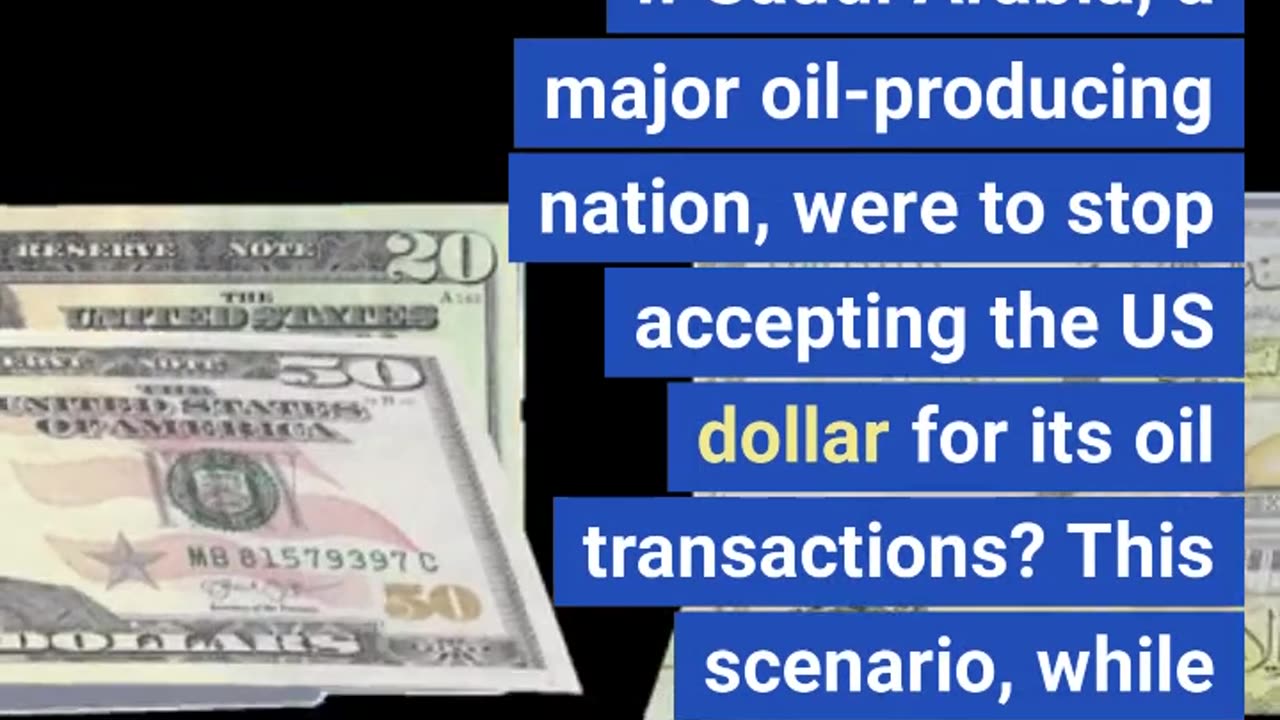Premium Only Content

BRICS: What Happens if Saudi Arabia Stops Accepting US Dollar for Oil?
BRICS: What Happens if Saudi Arabia Stops Accepting US Dollar for Oil?
Introduction
In the realm of international economics, there's a question that has recently stirred up discussions and debates among experts and enthusiasts alike: What would happen if Saudi Arabia, a major oil-producing nation, were to stop accepting the US dollar for its oil transactions? This scenario, while hypothetical at the moment, carries significant implications not just for the BRICS nations (Brazil, Russia, India, China, and South Africa) but for the global economy as a whole. In this article, we'll delve into the potential consequences of such a shift and explore how it could reshape the dynamics of international trade and finance.
The Petrodollar System: A Brief Overview
Before we dive into the hypothetical scenario, it's essential to understand the role of the US dollar in the global oil trade. For decades, the US dollar has been the dominant currency used in international oil transactions, a system often referred to as the "petrodollar" system. Under this arrangement, countries around the world needed to hold substantial reserves of US dollars to facilitate their oil imports. This has effectively propped up the demand for the dollar and provided the United States with significant economic leverage.
The BRICS Perspective
1. Dependence on the Dollar
The BRICS nations are major players in the global energy market, both as consumers and producers. However, their dependence on the US dollar for oil transactions has long been a point of contention. If Saudi Arabia were to abandon the dollar, it could offer these nations an opportunity to reduce their reliance on the US currency.
2. Diversification of Reserves
One likely response from BRICS countries would be to diversify their foreign exchange reserves. They might increase their holdings in other currencies, such as the Euro, Chinese Yuan, or even gold, to mitigate the risks associated with a weakening dollar.
3. Potential for Bilateral Agreements
The BRICS nations could explore the possibility of entering into bilateral agreements for oil trade, bypassing the need for the US dollar altogether. These agreements might involve using their own currencies or a mutually agreed-upon alternative.
Global Ramifications
4. Impact on the US Dollar
A shift away from the dollar by Saudi Arabia, one of its biggest supporters, could lead to a depreciation of the US dollar. This could have ripple effects throughout the global financial system, impacting exchange rates, inflation, and interest rates.
5. Geopolitical Tensions
The geopolitical landscape could see significant shifts, as the United States may view such a move as a challenge to its economic dominance. Tensions between nations could rise, potentially leading to trade disputes and diplomatic conflicts.
6. Oil Prices and Market Volatility
The uncertainty surrounding a change in the oil trading currency could lead to increased market volatility and fluctuations in oil prices. This could affect not only energy-importing nations but also industries dependent on stable energy costs.
Conclusion
In conclusion, the hypothetical scenario of Saudi Arabia ceasing to accept the US dollar for oil transactions is a complex issue with far-reaching consequences. While it may offer an opportunity for the BRICS nations to reduce their dollar dependence, it also presents risks and uncertainties in the global financial landscape. The petrodollar system's stability has been a cornerstone of the international monetary system for decades, and any significant disruption to it would have profound implications.
-
 34:27
34:27
The Connect: With Johnny Mitchell
14 hours ago $8.86 earnedCan He Stop Them? Inside Trumps War On Mexican Drug Cartels & The New Era Of Mexican Organized Crime
21.4K6 -
 2:33:15
2:33:15
Tundra Tactical
6 hours ago $7.13 earnedLuis Valdes Of GOA Joins The Worlds Okayest Firearms Live Stream!!!
23.2K -
 1:03:41
1:03:41
Man in America
15 hours agoAre Trump & Musk the COUNTER-ELITES? w/ Derrick Broze
61.4K33 -
 3:45:08
3:45:08
DLDAfterDark
6 hours ago $8.37 earnedDLD Live! SHTF Handguns! Which Would You Choose?
34K2 -
 1:50:38
1:50:38
Mally_Mouse
8 hours agoSaturday Shenanigans!! - Let's Play: Mario Party Jamboree
44.6K -
 1:13:00
1:13:00
Patriots With Grit
12 hours agoWill Americans Rise Up? | Jeff Calhoun
36.4K13 -
 14:55
14:55
Exploring With Nug
12 hours ago $10.67 earnedWe Found Semi Truck Containers While Searching for Missing Man!
53.8K7 -
 27:57
27:57
MYLUNCHBREAK CHANNEL PAGE
20 hours agoOff Limits to the Public - Pt 3
117K62 -
 38:07
38:07
Michael Franzese
13 hours agoLeaving Organized Crime and Uncovering Mob in Politics: Tudor Dixon and Michael Franzese
97K15 -
 2:42:54
2:42:54
Jewels Jones Live ®
2 days agoAMERICA IS BACK | A Political Rendezvous - Ep. 111
76.9K48